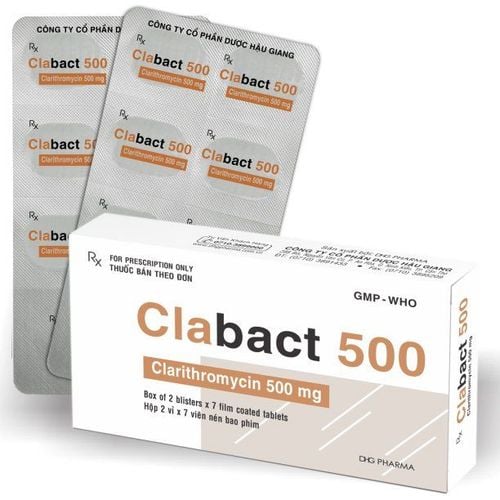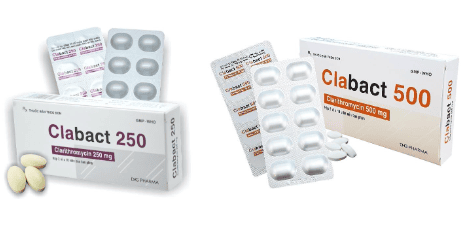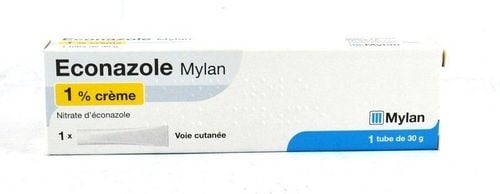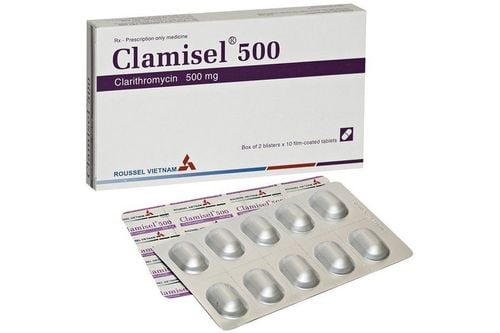This is an automatically translated article.
Meyerclari belongs to the group of antiparasitic, anti-infective, anti-viral, anti-fungal drugs, effective in the treatment of infections caused by susceptible bacteria. Meyerclari is used under the direction of the treating doctor.
1. What is Meyerclari?
What is Meyerclari? Meyerclari drug has the main active ingredient Clarithromycin 500mg and other excipients just enough. The drug is prepared in the form of film-coated tablets, packed in boxes, boxes of 2 blisters x 10 tablets or boxes of 5 blisters x 10 tablets.
2. Uses of Meyerclari
2.1 Uses - indications Meyerclari is indicated for the treatment of infections caused by sensitive bacteria such as:
People with respiratory infections such as pharyngitis, sinusitis, otitis media, bronchitis acute and chronic management, community-acquired pneumonia. People with mild to moderate skin and soft tissue infections People with superinfection in HIV-infected patients with Mycobacterium avium or M. avium complex infections People with peptic ulcers caused by H.pylori infection 2.2 Contraindications Meyerclari is contraindicated for use in the following cases:
People with a history of allergy or hypersensitivity to macrolide antibiotics or clarithromycin component in the drug. Patients who are being treated with Terfenadine, have a history of heart disease or have electrolyte disturbances. Patients are using derivatives such as pimoside, cisapride, ergoramin. Note: Cases of contraindications to the use of Meyerclari should be understood as absolute contraindications, ie not for any reason that those contraindications are flexibly used.
3. Usage and dosage of Meyerclari
How to use: Meyerclari is prepared in the form of film-coated tablets that should be used directly orally, with a small amount of boiled and cooled filtered water. Users should not take the drug with other liquids such as alcohol, beer, carbonated drinks or crush, break the tablet in half so as not to affect the ingredients in Meyerclari. Users can take the drug before or after a meal, because food does not affect the effect of the drug.
Dosage:
For children over 12 years old and adults:
Used to treat infections of the respiratory tract, skin and soft tissues: use the usual dose of 250mg x 2 times/day, continuously for 7 days. day. For severe infections, the dose can be increased to 500mg twice a day and the duration of treatment can be extended up to 14 days. For the treatment of peptic ulcer disease caused by H.pylori bacteria: 1 tablet x 2 times/day, continuously used for 7 to 14 days, depending on the doctor's indications. Treatment of Mycobacterium infections: starting dose of 500mg x 2 times/day, continuously for 3 to 4 weeks. If no improvement is seen, the dose can be increased to 1000mg twice daily. For people with renal failure: it is necessary to reduce the total therapeutic dose by half, it is not recommended to use it for more than 14 days.
In case of missed dose: the patient can take Meyerclari as soon as he remembers. However, if it is too close to the time for your next dose, skip the missed dose and take the dose exactly as indicated in the prescription. It is recommended that patients do not take a double dose of Meyerclari to make up for a previously missed dose.
In case of overdose: When using large amounts of Clarithromycin can cause gastrointestinal symptoms.
Treatment: The patient needs to be hospitalized, perform gastric lavage and apply other combined treatment measures. Note: serum concentrations of Clarithromycin will not be affected by hemodialysis or peritoneal dialysis.
4. Side effects of the drug Meyerclari
During the use of Meyerclari, in addition to the main use that the drug brings, users may also experience some of the following side effects:
Common reactions: nausea, vomiting, abdominal pain, diarrhea
Uncommon reactions: glossitis, stomatitis, taste disturbances, headache
There are also some other reactions of varying degrees such as:
Anaphylactic reactions, urticaria, rash mild on the skin. For people with special hypersensitivity, Stevens-Johnson symptoms may appear. Pseudomembranous colitis, liver dysfunction such as changes in laboratory results, hepatitis with or without associated jaundice, but usually reversible. Very rarely, symptoms of severe liver dysfunction, liver failure, and death have been reported. Note: If users experience any of the above symptoms or other symptoms suspected of using Meyerclar, they should immediately inform their doctor about their current condition for advice on how to handle it. Fastest and best.
5. Meyerclari . drug interactions
Some user interaction reactions to note when using Meyerclari drugs:
Interactions with alkaloid derivatives: causing vasoconstriction, increasing toxicity of these substances. Therefore, it cannot be combined at the same time. Interactions with other macrolides: increases the concentration of drugs to be metabolized, so caution should be exercised when used in combination. The active ingredient Clarithromycin increases the concentration of theophylline in the blood, so the patient should be regularly monitored the plasma theophylline concentration when combined. For people taking warfarin, clarithromycin may increase the anticoagulant effect of warfarin. Therefore, patients should be regularly monitored for active prothrombin. With digoxin: increased serum digoxin concentration when used in combination. With Carbamazepine: Clarithromycin increases the potency of carbamazepine by reducing the rate of excretion. The combination with related non-sedating antihistamines such as astemizol should be avoided: due to metabolic changes, cardiac arrhythmias should be avoided. With zidovudine in adult HIV-infected patients: decreased steady-state zidovudine concentrations. In this case, the two drugs should be administered at intervals of 1-2 hours. Note: In order to minimize the unfortunate interaction reactions that occur during the use of Meyerclari, the patient should inform the doctor of all drugs, supplements, vitamins and minerals that he or she is taking. are using or intend to use to get the most appropriate combination advice.
6. Some notes when using Meyerclari
When using Meyerclari, patients need to remember some of the following notes:
Because Clarithromycin is excreted mainly by the liver and kidneys, caution should be used when using the drug in patients with impaired liver and kidney function at low levels. medium and heavy. For individuals with creatinine clearance, the total therapeutic dose should be halved. Prolonged and repeated use of Meyerclari may cause the growth of fungi and bacteria that are no longer susceptible to the drug. If this occurs, the drug should be discontinued and the appropriate dose instituted. In rare cases, H.pylori bacteria can become resistant to the active ingredient Clarithromycin. Meyerclari is not recommended for use in pregnant women during the first trimester of pregnancy or during lactation. The drug should only be used when the benefits outweigh the risks and must be followed closely by the doctor's prescription. Use caution when using the drug in the elderly, because the sensitivity of these subjects to the drug may be greater than that of normal adults. Hopefully, the information shared above about Meyerclari will help users gain more useful knowledge and ways to handle situations during drug use.
Follow Vinmec International General Hospital website to get more health, nutrition and beauty information to protect the health of yourself and your loved ones in your family.
Please dial HOTLINE for more information or register for an appointment HERE. Download MyVinmec app to make appointments faster and to manage your bookings easily.













